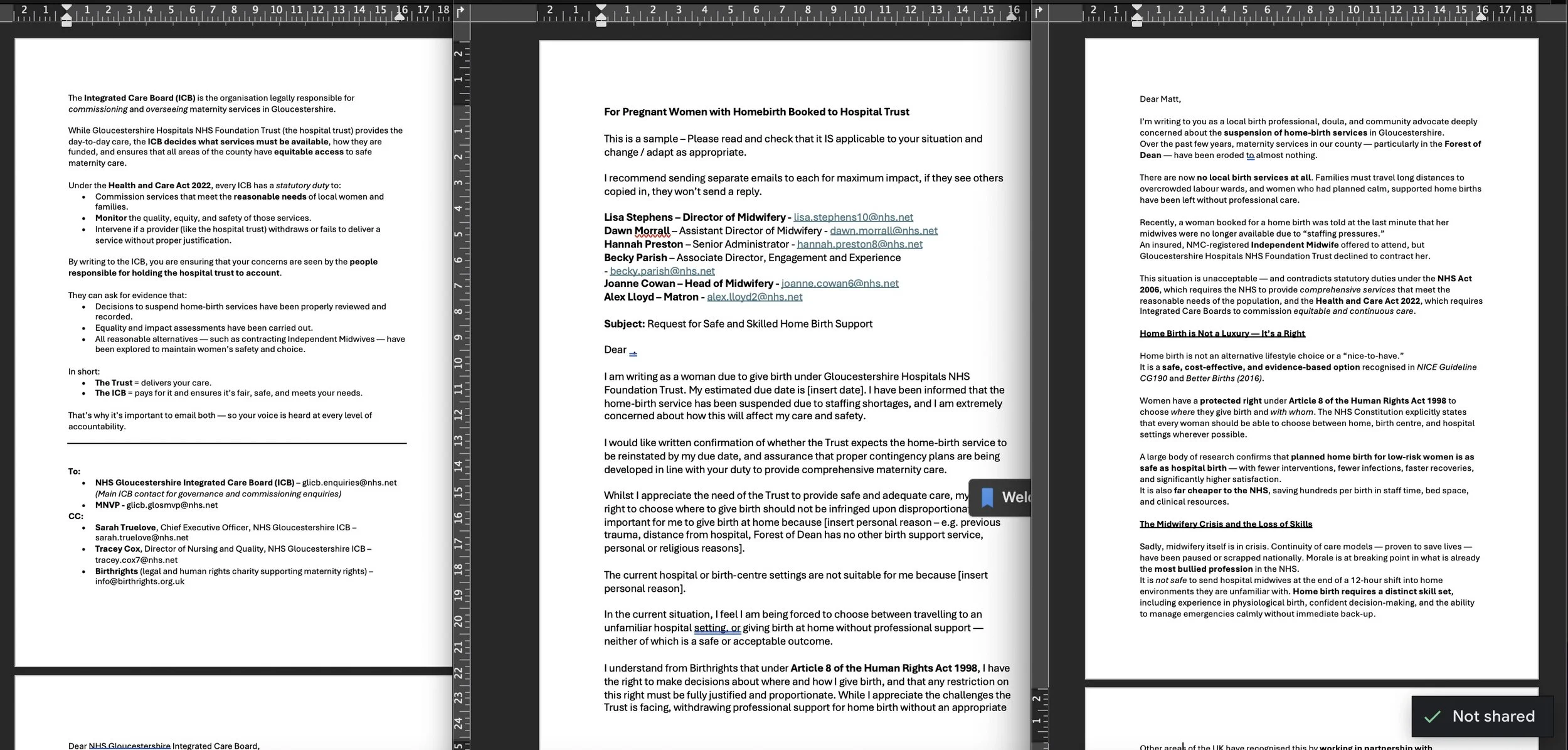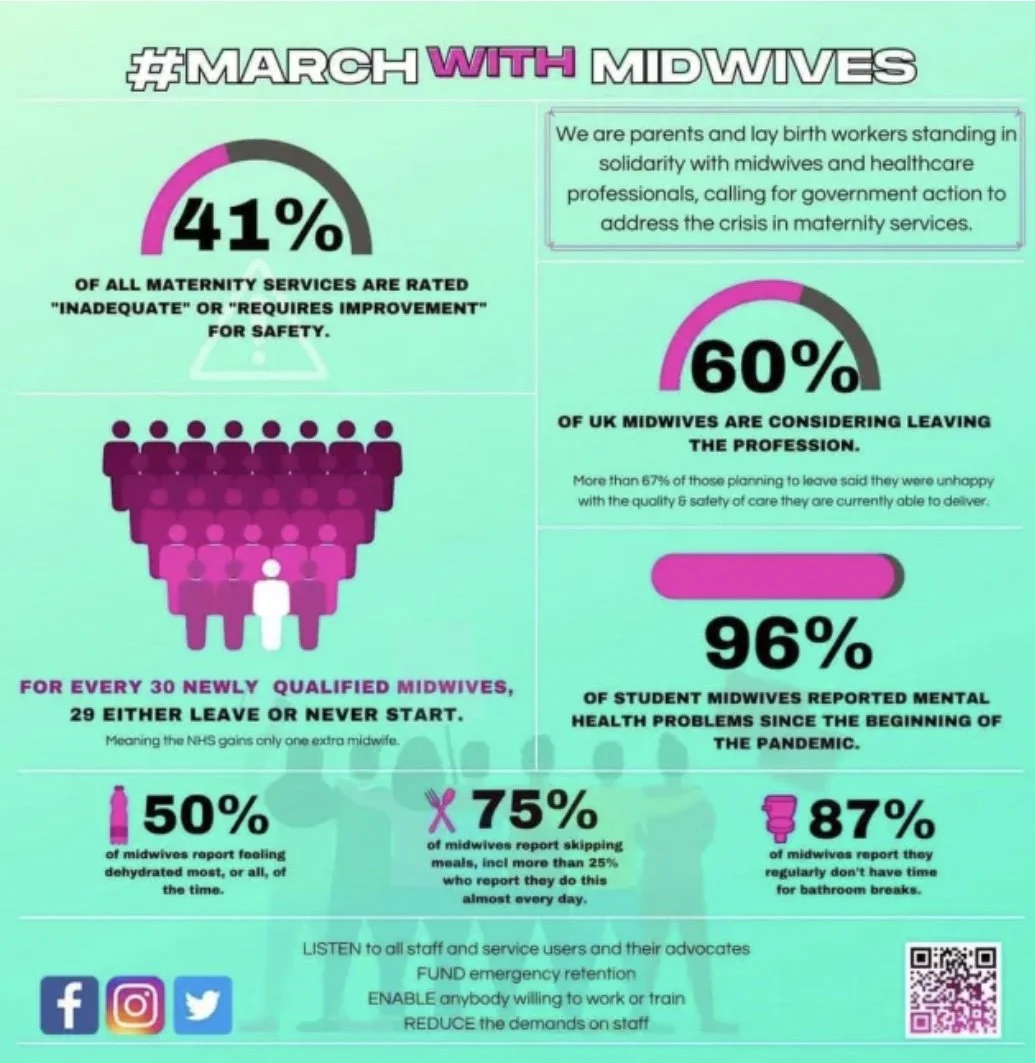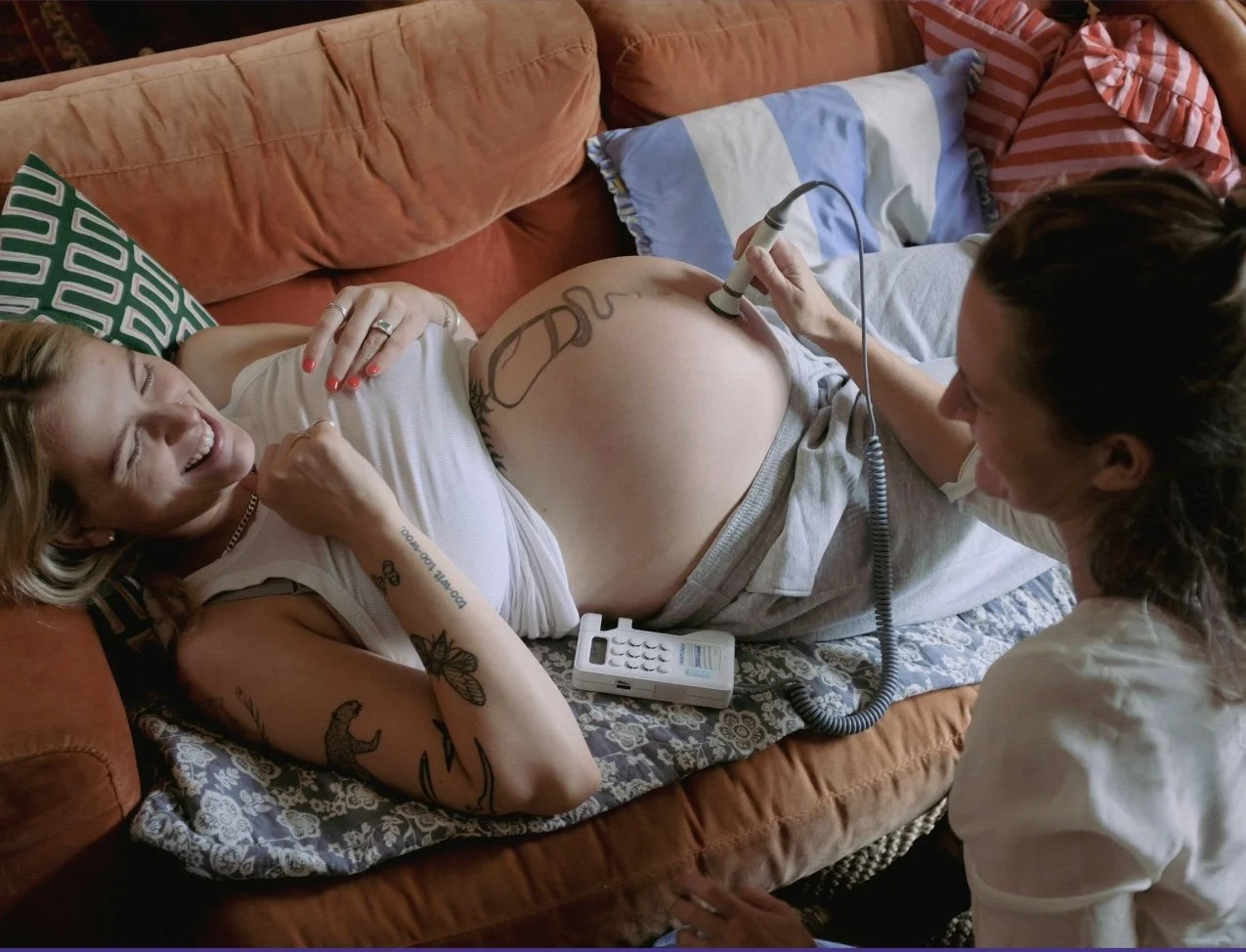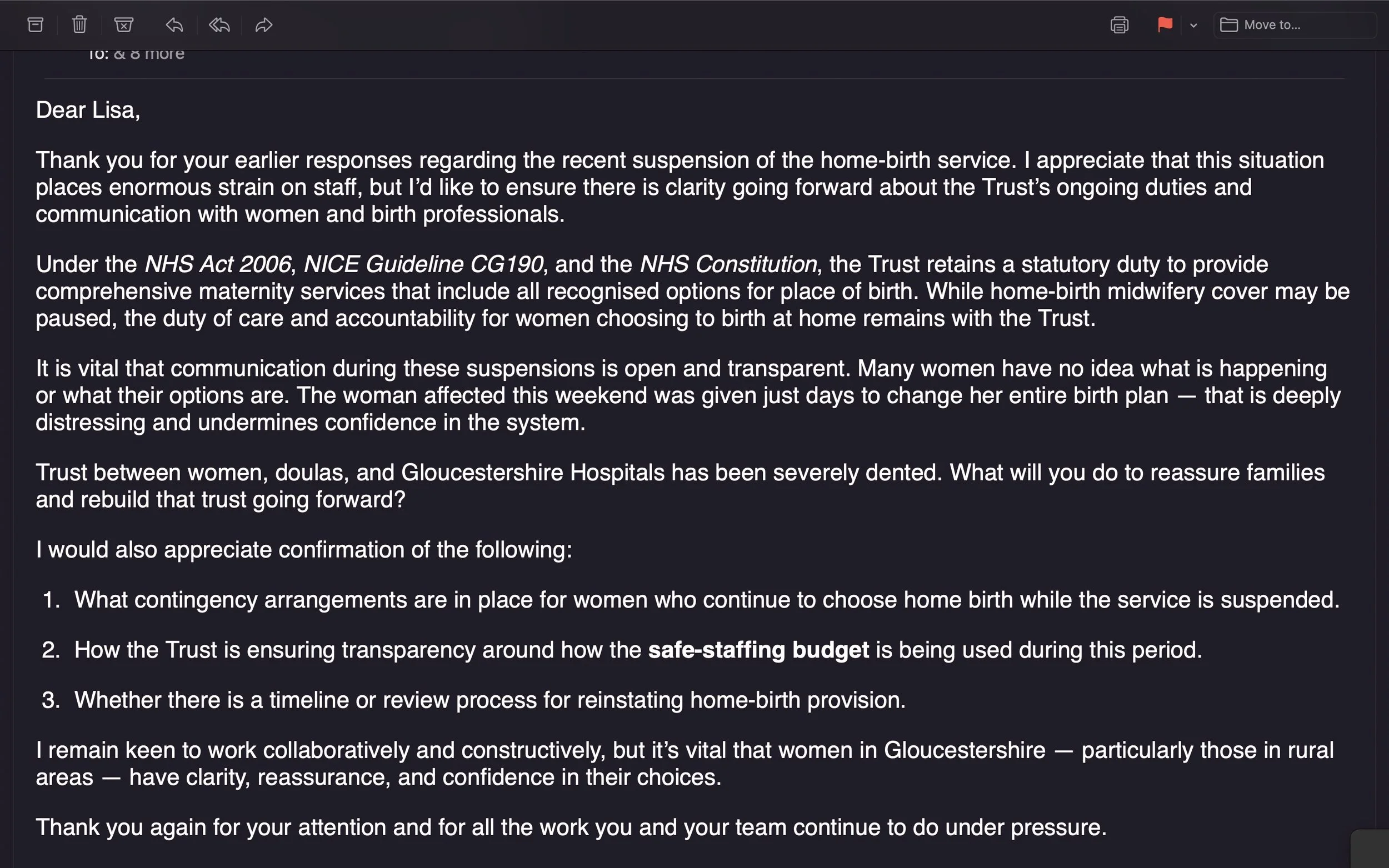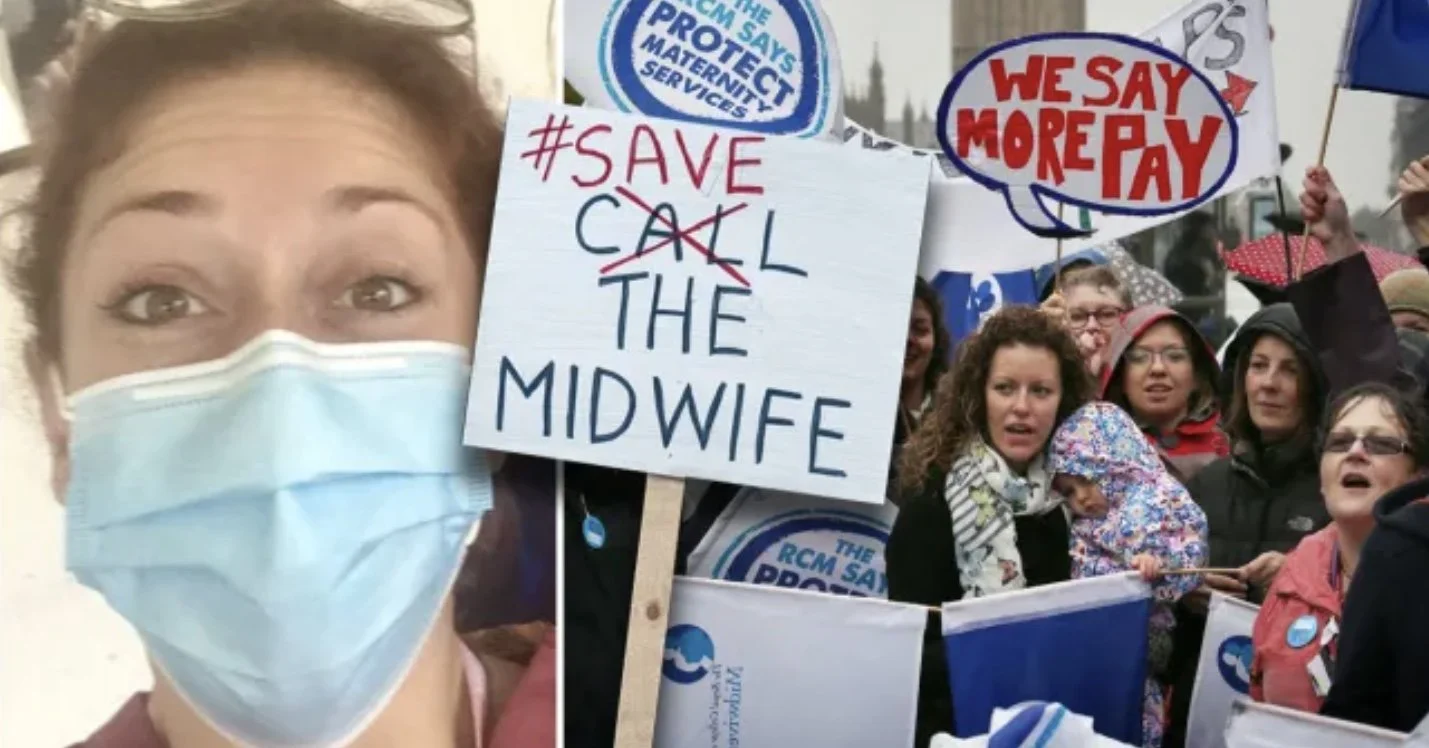Template Letters For Home Birth Closures - Reinstate Safe Skilled Midwifery Care
When Home Birth Services Close, Women and Midwives Both Lose
Template letters linked at the bottom of the page..
The suspension of home birth services across Gloucestershire has left many families reeling
— and asking the same question: what now?
For some, home birth isn’t a preference but a necessity
— a safe, familiar environment that supports their physiology,
their mental wellbeing, and their right to birth where they feel safest.
Yet once again, women in the Forest of Dean and beyond are being told there is
“no capacity” to support home births,
and that their only option is to travel into hospital.
This isn’t a matter of preference; it’s a matter of rights, safety, and trust.
Why Home Birth Matters
Choice of place of birth isn’t a luxury
— it’s a cornerstone of respectful, safe maternity care.
When women have the freedom to choose where they give birth, they experience:
Greater feelings of safety and control
Lower rates of intervention
Fewer complications and faster recovery
A stronger start to bonding and breastfeeding
It’s not only mothers who benefit.
Midwives working in continuity models
— knowing the women and families they care for —
experience higher job satisfaction,
less burnout, and far better outcomes overall.
This is what genuine safety looks like.
If you are in any doubt, listen to this excellent and overwhelming review of the evidence.
What’s Really Making Care Unsafe
We keep hearing that home births are being suspended “for safety reasons,”
but we must ask — whose safety, and why?
Gloucestershire Hospitals NHS Foundation Trust has paid out nearly £20 million in birth injury claims since 2020, yet the cause of harm isn’t home birth — it’s a broken system.
(Read more about this here → £20 Million in Birth Injury Claims)
Midwives have been stripped of autonomy,
forced into rota systems where
- as we have seen in the Jennifer Cahill tragedy
- they may be sent to attend a woman in labour after a 12-hour labour ward shift,
having never met her before.
Midwives are carrying caseloads so large that compassionate,
relationship-based care has become impossible.
Doulas and mothers across the Gloucestershire describe the change:
“Ten years ago, maternity felt like a village — midwives knew the women, and the women trusted them. Now, it’s a revolving door. Tests get missed. Women in labour sit waiting in triage. Everyone’s exhausted.”
The result is a system that fails women and midwives.
Continuity is the Baseline for Safety
In my recent piece on the Prestwich Home Birth Tragedy, I explored how fragmentation of care has deadly consequences.
True safety depends on continuity of care
— a known, trusted relationship where a woman’s needs, risks, and preferences are understood.
The Royal College of Midwives’ Good Midwifery for Women’s Rights report (2024) recommends creative staffing models, including the use of Maternity Support Workers to free up midwives for relational, skilled care.
📄 Read the RCM Report – Section 1 (PDF)
Independent Midwifery: A Proven Solution
Many midwives have now chosen to work independently
— they don’t want to leave the profession, they want to truly practice it.
Independent Midwives offer one-to-one care, safe, skilled, compassionate care.
They know their clients, their families, and their stories.
They’re on-call throughout pregnancy and birth,
and they support women wherever they choose to birth — at home or in hospital.
Case studies consistently show that when a woman knows her midwife,
she gains confidence in herself, her body, and her birth.
She’s far more likely to birth physiologically,
avoid unnecessary and potentially risky interventions,
and have a positive, empowering experience.
Continuity like this isn’t idealism — it’s evidence-based,
and it’s exactly what the NHS were supposed to deliver.
The Local Reality: Gloucestershire’s Quiet Closures
Following the suspension of Gloucestershire’s home birth service, it’s impossible to ignore a wider pattern.
The Aveta Birth Centre was “temporarily” closed three years ago — reportedly for just two weeks pending a review. It has never reopened.
In the Forest of Dean, all birth services have now been removed.
There’s no birth centre, no home birth option, and the promised ultrasound clinic in the new community hospital has quietly failed to materialise.
This week I contacted Lisa Stephens, Director of Midwifery, to ask where the AEQI (Equality and Impact Assessment) was and what contingency plans were in place for women already booked for home birth.
We had an Independent Midwife ready and willing to step in — experienced, insured, and able to provide the support that the Trust could not.
Lisa Stephens’ response was, frankly, deeply unsatisfactory.
It is entirely unacceptable that these serious questions about duty of care, staffing budgets, and contingency planning remain unanswered - postponed for some future ‘PR Event’
And the urgency of this woman’s situation dismissed.
I have now submitted these same questions formally as Freedom of Information (FOI) requests, which may well bring clarity faster than trying to squeeze blood from this stone.
Meanwhile, maternity services in Gloucestershire continue to shrink,
with no sign of meaningful action to address the underlying issues.
We don’t yet know this particular woman’s story, but others are beginning to emerge
— women who have suffered injuries from obstetric violence, unnecessary or coerced interventions, and who now vow never to set foot in that hospital again.
It remains unclear whether Aveta Birth Centre will reopen
or whether the women booked for home birth will truly have the option to use Stroud Birth Centre.
A common tactic of stretched maternity services is to dangle the carrot
— suggesting the birth centre will be available —
only for it to be withdrawn at the last moment,
often while a woman is already in labour and least able to advocate for herself.
What You Can Do Now
If this concerns you — and it should — there are concrete steps you can take today.
📨 Write to / Email these people
Gloucestershire Hospitals NHS Foundation Trust
— ask for the Equality and Impact Assessment and an immediate plan to restore home birth provision.Gloucestershire ICB (Integrated Care Board)
— remind them that they are legally responsible for commissioning safe, equitable maternity care.Your MP and Local Councillors
— urge them to raise this publicly and press for an urgent review.
When you write, demand that the Trust and ICB contact community organisations who can help plug the gap — including those working with Independent Midwives who are skilled, autonomous, and ready to restore choice and respectful care to women across Gloucestershire.
You can also share this with your local media, family, and friends to help others understand what’s really at stake: the right to birth safely, supported, and with dignity.
Letters for Pregnant Women
Letters for Concerned Members of the Public
Rebuilding from the Roots
It’s time to re-imagine maternity care — not as a service that manages women,
but as a system that supports them.
Women deserve choice.
Midwives deserve autonomy.
And every family deserves the safety that comes from genuine, trusting continuity of care.
If the system cannot provide it, then together, we must.
That’s why I’ve launched a Free Doula Support Scheme here in the Forest of Dean
— offering one free place per month to a woman who might otherwise fall through the cracks.
It’s a small but vital step towards rebuilding trust, restoring continuity,
and showing what’s possible when care grows from community, not bureaucracy.
About the Author
Emma Gleave is a Doula, Birth Educator, and founder of Emma’s Antenatal, based in the Forest of Dean.
She offers antenatal classes, doula (birth companion) support, pregnancy massage, and community projects linking nature, wellbeing, and birth advocacy.

